Episodes
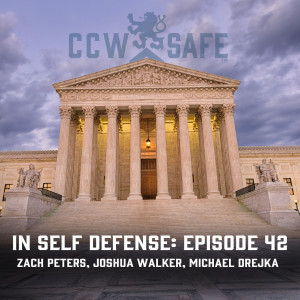
Wednesday Aug 07, 2019
In Self Defense - Episode 42: Zach Peters, Joshua Walker, Michael Drejka
Wednesday Aug 07, 2019
Wednesday Aug 07, 2019
Don West and Shawn Vincent explore three high-profile self-defense cases: the text-book home defense by Zach Peters; the surprise dismissal of murder charges against Joshua Walker; and updates in the Michael Drejka parkinglot shooting case.
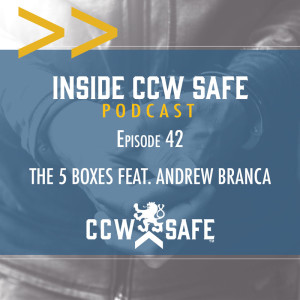
Wednesday Jul 31, 2019
Inside CCW Safe Podcast- Episode 42: Check The 5 Boxes feat Andrew Branca
Wednesday Jul 31, 2019
Wednesday Jul 31, 2019

In this podcast episode, Stan and Mike talk with self defense expert and attorney, Andrew Branca. Andrew is the founder of lawofselfdefense.com and provides excellent content for those who carry for protection.
The three talk about the 5 elements of self defense- Innocence, Imminence, Proportionality, Avoidance, and Reasonableness, and the importance of making sure that each element is met if you are ever forced to defend yourself. They also talk about removing the ambiguity of situations in order to avoid a possible threat, and if you can't avoid, to be able to articulate your case.
This is a great podcast for anyone who carries concealed.
Time: 52:41
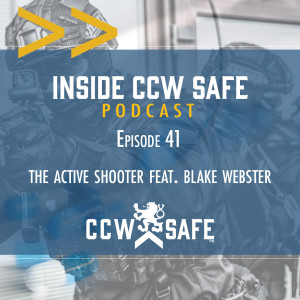
Wednesday Jul 24, 2019
In Self Defense- Episode 41: Active Shooter Interview with Blake Webster
Wednesday Jul 24, 2019
Wednesday Jul 24, 2019

In this episode, Stan and Mike talk with long time friend and mentor, Blake Webster. Blake is a police officer and is the longest standing member of the Oklahoma City Police Tactical Unit. Blake talks about active shooter training, the history of it, and where it is today, and touches on some things to think about as an armed citizen.
Blake's education and training include:
- Oklahoma State University, 2002 (45 hours) ----- Criminal Justice/Police Administration
- Rose State College, 1995 (13 hours) --------------- Undergraduate Studies
- Oklahoma Baptist University, 1985 (15 hours) ---Undergraduate Studies
- Basic Tactical Operator – October 1986
- Advanced Tactical Operator – October 1986
- Emergency Vehicle Operations Instructor – April 1987
- Certified by the Def Tech Corporation as Impact Munitions/Noise Flash Diversionary Devices/Chemical Munitions Instructor – October 1992
- Instructor Development – November 1992
- Custody Control Instructor – February 1995
- Sub Machine Gun Operator – May 1995
- NARC ASSAULT certified by Oklahoma Bureau of Narcotics and Dangerous Drugs – May 1997
- Rappel Master by Oklahoma Bureau of Narcotics and Dangerous Drugs – June 1997
- Firearms Instructor – October 1997
- Advanced Shotgun Instructor – October 1997
- Booby Traps and Tracking by Oklahoma Bureau of Narcotics and Dangerous Drugs – May 1999
- FBI instructor in Chemical Agents – April 2000
- TASER Maser Instructor – January 2001
- Cooper Institute “Physical Fitness Specialist – Law Enforcement” – April 2002
- International Association of Chiefs of Police as a Less Lethal Instructor – June 2004
- Auto Rifle and Carbine operator – February 2005
- Cooper Institute in “Biomechanics of Resistance Training” – October 2006
- TASER Armorer in the TASER M26 and X26 – August 2007
- Institute for the Prevention of In-Custody Deaths Instructor in Identification, Prevention, Management and Investigation of Sudden and In-Custody Deaths – August 2007
- Patrol Rifle Instructor – September 2008
- C.L.E.E.T Patrol Rifle Instructor – September 2008
- Lethality Assessment Instructor – January 2009
- National Tactical Officers Association Resolution of Barricaded Suspects – August 2009
- Train the Trainer Advanced Law Enforcement Rapid Response Training – July 2011
- Night Vision/Thermal Imagery/Laser Illumination operator – February 2013
- Simunitions Instructor School – August 2014
- National Tactical Officers Association Advanced SWAT School, 2015
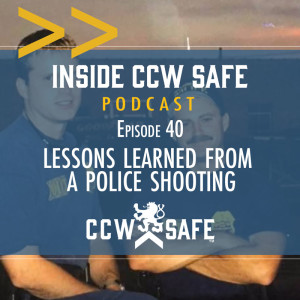
Wednesday Jul 17, 2019
In Self Defense- Episode 40: Lessons Learned from a Police Shooting
Wednesday Jul 17, 2019
Wednesday Jul 17, 2019

In this podcast, Stan continues to interview Mike about his shooting. Mike was involved in a shooting as a police officer, and was later sued in federal court, which was the foundation of the creation of CCW Safe. The lawsuit was kicked out at summary judgement, but that experience is what later led to the creation of CCW Safe.
Mike talks about some key learning points that came out of his shooting. One was training, which we all fall back on during critical stress incidents. It's imperative to continue training in various ways if you are going to carry concealed. Another was knowing what to expect in terms of the physiological effects that your body and mind may encounter. Some of these effects may be tunnel vision, auditory exclusion, intense second guessing, temporary memory loss, and temporary loss of motor skills.
This is a great podcast that can help prepare you if you are ever put into a situation where you have to defend yourself with deadly force.
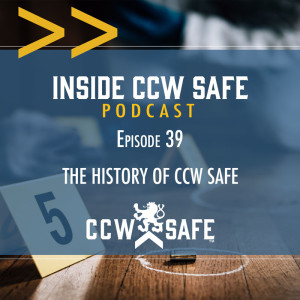
Thursday Jul 11, 2019
Inside CCW Safe Podcast- Episode 39: The History of CCW Safe
Thursday Jul 11, 2019
Thursday Jul 11, 2019

This week, Stan and Mike have a late night conversation about the startup of CCW Safe, and talk in depth about Mike's shooting he experienced as a police officer. Stan interviews Mike about his training and unit assignment at the time of his shooting.
Mike's shooting experience was the reason they formed CCW Safe, to protect retired and former police officers, military, and concealed carriers.
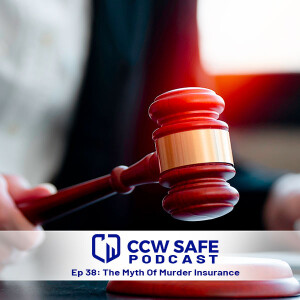
Wednesday Jul 03, 2019
Inside CCW Safe Podcast- Episode 38: The Myth of Murder Insurance feat. Gary Eastridge
Wednesday Jul 03, 2019
Wednesday Jul 03, 2019
This week, Stan and Mike talk with Gary Eastridge, Critical Incident Coordinator for CCW Safe, about the myth of murder insurance. There is no such thing as murder insurance. No company that offers coverage for concealed carriers will cover murder. The three talk about Gary's article on the myth, and explore some other issues with this ongoing battle against the NRA.
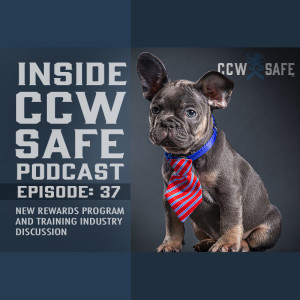
Wednesday Jun 12, 2019
Inside CCW Safe Podcast Episode 37: New Rewards Program and Training Industry Discussion
Wednesday Jun 12, 2019
Wednesday Jun 12, 2019
This week Stan, Mike and Justin talk discuss the new CCW Safe office mascot, rolling out a Rewards Program for members along with a discussion about the training industry, some trainers putting out interesting information, the changes we have seen over the last decade and where it is going in the future.
Full transcription coming soon!
SHOW NOTES:
John Murphy FPF Training: https://www.fpftraining.com/
FPF Criminal Assault Pre-Incident Indicators: https://www.youtube.com/watch?v=XPbCw9pV90c&list=PLhZ8SRFuOUJY_Cp_gtN7G6R1ZBK_mQyLj&index=5&t=6s
Ed Calderon: http://edsmanifesto.com/
Ed Calderon on Joe Rogan Podcast: https://www.youtube.com/watch?v=llhb2ymtsw8
Mike Green: https://www.green-ops.com/
Time: 53:59
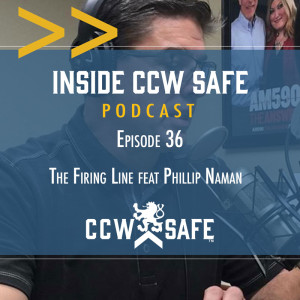
Wednesday Jun 05, 2019
Inside CCW Safe Podcast- Episode 36: The Firing Line feat. Phillip Naman
Wednesday Jun 05, 2019
Wednesday Jun 05, 2019

This week Stan and Mike interview Phillip Naman, host of the Firing Line Radio Show on AM 590 The Answer, out of San Bernardino, California. Phil talks about his background, how he was first introduced to firearms, and the background of the Firing Line Radio show. The three talk mainly about California and some of the things that are going on there, and how those things can affect the rest of the United States.
Full transcription coming soon!
Time: 52:31
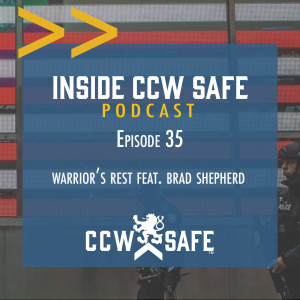
Wednesday May 22, 2019
Inside CCW Safe Podcast- Episode 35: Warriors Rest feat. Brad Shepherd
Wednesday May 22, 2019
Wednesday May 22, 2019

This week Stan and Mike talk with Brad Shepherd, co-founder and CEO of Warrior's Rest. Brad served over 27 years with the Oklahoma Highway Patrol before happily retiring and starting Warrior's Rest.
The three talk about what made them go into law enforcement in the first place, and talk about some of the things that they experienced through their careers, some of which had long lasting impacts on them.
They also talk about a very powerful video that was produced on Warrior's Rest recently about Ed Smith, a retired police officer from Modesto, CA who has a great story to tell. He is a 29 year veteran from 3 law enforcement agencies in California. The video can be seen here
Warrior's Rest Foundation is a resource for law enforcement personnel, departments and communities across the U.S.
Founders Brad Shepherd and Brett Key bring nearly 50 years of experience in law enforcement. Other members of our core team have decades of experience in law enforcement and crisis intervention. In the last 10 years, this team has responded to critical incidents, including line of duty death and natural disasters to perform mental health counseling and peer support crisis intervention. They also have assisted with development of peer support teams to help law enforcement personnel prepare for and respond to the effects of critical incidents.
Warrior's Rest Foundation works in partnership with other organizations to form a comprehensive support network.
Mission:
Working together we help to build resiliency with law enforcement, their partners, and their families to foster healthy professional and personal lives.
Values:
- Integrity--We demonstrate a commitment to honesty and strong moral principles in all that we say and do.
- Trust--We work to engender trust among law enforcement teams--that firm belief in the reliability, truth, ability, or strength of others.
- Courage--We help build the resilience required to persevere and withstand danger, fear, or difficulty.
A percentage of every HR218 CCW Safe membership will be donated to Warrior's Rest over 2019.
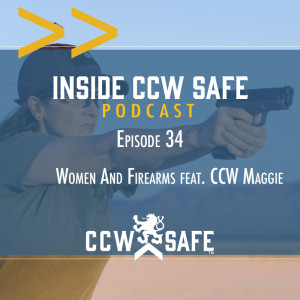
Wednesday May 08, 2019
Inside CCW Safe Podcast- Episode 34: Women and Firearms feat. Maggie Mordaunt
Wednesday May 08, 2019
Wednesday May 08, 2019

In this podcast, Stan and Mike talk with longtime friend, Maggie Mordaunt, otherwise known as CCW Maggie. Maggie is a firearms instructor in Las Vegas, Nevada, and the three talk about women in firearms, and talk about some topics surrounding that. Women make up a large part of the firearms industry from new permit applications, to gun purchases, to instructors and corporate leaders in the firearms industry.
Full transaction online at ccwsafe.com/blog
Time: 1:00:39

